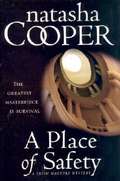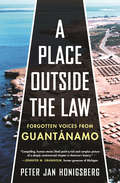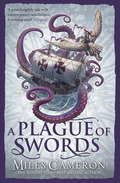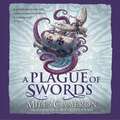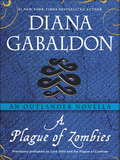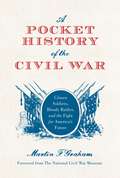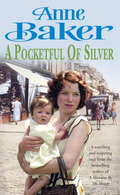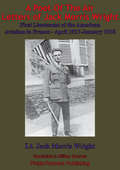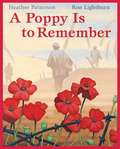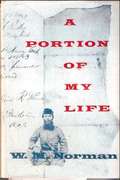- Table View
- List View
A Place Called Heartbreak
by Walter Dean MyersDescribes the ordeal of Major Fred Cherry, who was shot down in combat over Vietnam and spent seven-and-a-half years as a prisoner of war in Hanoi.
A Place Of Safety
by Natasha CooperBarrister Trish Maguire needs all the time she can find to help her young half-brother adjust to life after the violent death of his mother. Sir Henry Buxford, an influential acquaintance, has other ideas. He asks Trish to investigate one of his private charities, a magnificent art collection built up before 1914 and lost for most of the twentieth century. Taking a crash course in the murkier aspects of the art world, Trish is determined to unlock the secrets she is sure are hidden somewhere in the collection. Her research takes her not only into the heart of an engrossing love story, but also into the agonizing reality of the trenches of the First World War. She soon discovers a web of deceit that has spanned the decades since, catching all kinds of people in its filaments. Now, the innocent, the violent, and the victims all have to free themselves. And someone dies. With her trademark dexterity and hard-hitting suspense, Natasha Cooper brings us the unstoppable Trish Maguire in her most challenging and enthralling case to date.
A Place Outside the Law: Forgotten Voices from Guantanamo
by Peter Jan HonigsbergFirsthand testimonies from Guantánamo Bay, inspiring future generations to never repeat the human rights violations of the detention center.Law scholar and Witness to Guantánamo founder Peter Jan Honigsberg uncovers a haunting portrait of life at the military prison and its toll, not only on the detainees and their loved ones but also on its military and civilian personnel and the journalists who reported on it.Honigsberg conducted 158 interviews across 20 countries so that the people who lived and worked there could tell their heartbreaking and inspirational stories. In each one, we face the reality that the healing process cannot begin until we start the conversation about what was done in the name of protecting our country. These are a few of them. Many alleged operatives in Guantánamo were purchased by the United States for ransom from Afghan and Pakistani soldiers. Brandon Neely, a prison guard who processed the first group of suspected operatives to arrive in Cuba, flew to London to embrace the detainees he guarded after leaving the military. Navy whistleblower Matt Diaz covertly released the names of 500 detainees by sending them in a greeting card to a lawyer in New York. Journalist Carol Rosenberg committed the past 17 years of her career to documenting life at Guantánamo. And Damien Corsetti, an interrogator who came to be known as the "King of Torture," received ribbons and awards for the same cruel actions for which he was later prosecuted. In startling, aching prose, A Place Outside the Law shines a light on these unheard voices, and through them, encourages the global community to embrace humanity as our greatest tool to make the world a safer place.
A Place Where Sunflowers Grow
by Amy Lee-TaiBilingual English/Japanese. A young girl finds things to be joyful about in the Topaz Internment Camp.Mari wonders if anything can bloom at Topaz, where her family is interned along with thousands of other Japanese Americans during World War II. The summer sun is blazingly hot, and Mari's art class has begun. But it's hard to think of anything to draw in a place where nothing beautiful grows. Somehow, glimmers of hope begin to surface under the harsh sun--in the eyes of a kindly art teacher, in the tender words of Mari's parents, and in the smile of a new friend. Inspired by her family's experiences, author Amy Lee-Tai has crafted a story rooted in one of America's most shameful historical episodes--the internment of 120,000 Japanese Americans during World War II. The art schools which offered internees moments of solace and self-expression are a little known part of this history. Amy Lee-Tai's gentle prose and Felicia Hoshino's stunning mixed media images are a testimony to hope and how it can survive alongside even the harshest injustice.
A Place to Belong: A gripping, heartwrenching saga set in World War Two Ireland
by Cathy MansellSet against the glorious backdrop of World War Two Ireland, this dramatic, emotional and romantic novel is perfect for fans of Maeve Binchy, Lorna Cook, Tracy Rees and Jenny Ashcroft!'A romantic saga writer to watch' PETERBOROUGH TELEGRAPHShe lost everything in one night. Now she must fight for happiness.It's 1943 and Ireland has escaped the worst of the war raging in Europe, but life is not without its hardships. When fire breaks out at the convent in Cavan where she has spent the past ten years, orphan Eva Fallon barely escapes with her life.She's offered a bed for the night by Ma Scully, whilst her nephew Cathal, visiting from Dublin, helps battle the blaze. Seventeen-year-old Eva has never known such kindness but she's too proud to take advantage, and finds a job at Blackstock's farm, setting in motion a chain of events that will change her life forever.Amidst tragedy and hardship, the only ray of light is the friendship of Ma Scully and her growing, secret love for Cathal. And through it all Eva clings to her hope that one day she will find a place where she can truly belong.Don't miss Cathy Mansell's next powerfully heartrending family saga of three sisters in 1950s Ireland - The Dublin Girls - out now! Here's what readers are saying:'Glorious - a cross between Maeve Binchy and Catherine Cookson' 5* early reader review'A superb saga' PETERBOROUGH TELEGRAPH'A heart-warming story full of characters you'll come to love' ROSIE GOODWIN'Page-turning and compelling... Most highly recommended' MARGARET KAINE'Rarely have I read a book where every character springs from the pages so authentically' JEAN CHAPMAN'A warm-hearted, engaging story' MARGARET JAMES, WRITING MAGAZINE
A Place to Belong: A gripping, heartwrenching saga set in World War Two Ireland
by Cathy MansellSet against the glorious backdrop of World War Two Ireland, this dramatic, emotional and romantic novel is perfect for fans of Maeve Binchy, Lorna Cook, Tracy Rees and Jenny Ashcroft!'A romantic saga writer to watch' PETERBOROUGH TELEGRAPHShe lost everything in one night. Now she must fight for happiness.It's 1943 and Ireland has escaped the worst of the war raging in Europe, but life is not without its hardships. When fire breaks out at the convent in Cavan where she has spent the past ten years, orphan Eva Fallon barely escapes with her life.She's offered a bed for the night by Ma Scully, whilst her nephew Cathal, visiting from Dublin, helps battle the blaze. Seventeen-year-old Eva has never known such kindness but she's too proud to take advantage, and finds a job at Blackstock's farm, setting in motion a chain of events that will change her life forever.Amidst tragedy and hardship, the only ray of light is the friendship of Ma Scully and her growing, secret love for Cathal. And through it all Eva clings to her hope that one day she will find a place where she can truly belong.Don't miss Cathy Mansell's next powerfully heartrending family saga of three sisters in 1950s Ireland - The Dublin Girls - out now! Here's what readers are saying:'Glorious - a cross between Maeve Binchy and Catherine Cookson' 5* early reader review'A superb saga' PETERBOROUGH TELEGRAPH'A heart-warming story full of characters you'll come to love' ROSIE GOODWIN'Page-turning and compelling... Most highly recommended' MARGARET KAINE'Rarely have I read a book where every character springs from the pages so authentically' JEAN CHAPMAN'A warm-hearted, engaging story' MARGARET JAMES, WRITING MAGAZINE
A Place to Belong: A gripping, heartwrenching saga set in World War Two Ireland
by Cathy MansellShe lost everything in one night. Now she must fight for happiness.Dramatic, emotional and romantic, if you love Lorna Cook, Tracy Rees and Jenny Ashcroft, you'll love this gripping and heartwrenching novel from Cathy Mansell, set against the sweeping backdrop of Dublin and rural Ireland in the 1940s. It's 1943 and Ireland has escaped the worst of the war raging in Europe, but life is not without its hardships. When fire breaks out at the convent in Cavan where she has spent the past ten years, orphan Eva Fallon barely escapes with her life.She's offered a bed for the night by Ma Scully, whilst her nephew Cathal, visiting from Dublin, helps battle the blaze. Seventeen-year-old Eva has never known such kindness but she's too proud to take advantage, and finds a job at Blackstock's farm, setting in motion a chain of events that will change her life forever.Amidst tragedy and hardship, the only ray of light is the friendship of Ma Scully and her growing, secret love for Cathal. And through it all Eva clings to her hope that one day she will find a place where she can truly belong.(P) 2019 Headline Publishing Group Ltd
A Place to Hang the Moon
by Kate AlbusFor fans of The War That Saved My Life and other World War II fiction, A Place to Hang the Moon is the tale of three orphaned siblings who are evacuated from London to live in the countryside with the secret hope of finding a permanent family. <P><P>It is 1940 and William, 12, Edmund, 11, and Anna, 9, aren't terribly upset by the death of the not-so-grandmotherly grandmother who has taken care of them since their parents died. But the children do need a guardian, and in the dark days of World War II London, those are in short supply, especially if they hope to stay together. Could the mass wartime evacuation of children from London to the countryside be the answer? It's a preposterous plan, but off they go—keeping their predicament a secret, and hoping to be placed in a temporary home that ends up lasting forever. Moving from one billet to another, the children suffer the cruel trickery of foster brothers, the cold realities of outdoor toilets and the hollowness of empty stomachs. They find comfort in the village lending library, whose kind librarian, Nora Müller, seems an excellent choice of billet, except that her German husband's whereabouts are currently unknown, and some of the villagers consider her unsuitable. <p><p> A Place to Hang the Moon is a story about the dire importance of family: the one you're given, and the one you choose.
A Place to Hide: A Novel
by Ronald H. BalsonFrom the winner of the National Jewish Book AwardTheodore “Teddy” Hartigan is the scion of a wealthy Washington, D.C. family who place him into a comfortable job at the State Department and a placid diplomat’s career. In 1938, as Hitler’s inexorable rise continues, Teddy is re-assigned to the US Consulate in Amsterdam to replace fleeing staff.Teddy’s job is to process visa applications, and by 1939, refugees from Nazi-conquered Poland, Austria, and other countries are desperate to secure safe passage to America. As Hitler sweeps through France, Belgium, Luxembourg, Denmark, and Holland, the screws tighten and law after virulent law is passed to threaten the lives, indeed the very existence of the Jewish people. When Teddy and his girlfriend Sara are introduced to an orphaned young girl named Katy, who has been abandoned on the grounds of a nursery school, they agree to adopt her. Teddy comes to realize that he holds the key to saving lives, whether five, fifty, or five hundred—and makes the dangerous and selfless decision to join with underground groups and use his position at the Consulate to rescue those with no other avenue of escape.Powerful and dramatic, National Jewish Book Award winner Ronald H. Balson’s A Place to Hide explores the deeply-moving actions of an ordinary man who resolves, under perilous circumstances, to make a difference.
A Plague of Swords
by Miles CameronONE ENEMY HAS FALLENA GREATER ONE REMAINSNOW IT'S WAR . . .The Red Knight withstood the full might of his enemy, and won the day. In a victory which will be remembered through the ages, he brought disparate factions together and turned them into allies against a more powerful foe than they had ever seen.Now, he will need his allies more than ever.Because behind one adversary hid another - one with allies of their own - whose goal was never to destroy Alba, but to distract the Kingdom while achieving his true aim. And whatever it is, it's probably not in the Red Knight's interest.With one army defeated, now the Red Knight must fight again . . . and for every one of his allies there is a corresponding enemy. Spread out in different lands, and on sea, it will all come down to one last gamble. And to whether or not the Red Knight has guessed their foe's true intentions.With each throw of the dice, everything could be lost . . .
A Plague of Swords
by Miles CameronONE ENEMY HAS FALLENA GREATER ONE REMAINSNOW IT'S WAR . . .The Red Knight withstood the full might of his enemy, and won the day. In a victory which will be remembered through the ages, he brought disparate factions together and turned them into allies against a more powerful foe than they had ever seen.Now, he will need his allies more than ever.Because behind one adversary hid another - one with allies of their own - whose goal was never to destroy Alba, but to distract the Kingdom while achieving his true aim. And whatever it is, it's probably not in the Red Knight's interest.With one army defeated, now the Red Knight must fight again . . . and for every one of his allies there is a corresponding enemy. Spread out in different lands, and on sea, it will all come down to one last gamble. And to whether or not the Red Knight has guessed their foe's true intentions.With each throw of the dice, everything could be lost . . .'A stirring, gritty and at times quite brutal epic fantasy' Tor.com(p) 2016 Hachette Audio
A Plague of Zombies: An Outlander Novella (Lord John Grey)
by Diana GabaldonDiana Gabaldon, #1 New York Times bestselling author of the acclaimed Outlander series, delivers a captivating tale of history and suspense, with a touch of the supernatural, featuring Lord John Grey. This novella, originally published as "Lord John and the Plague of Zombies," is now available as a standalone eBook. Lord John Grey, a lieutenant-colonel in His Majesty's army, arrives in Jamaica with orders to quash a slave rebellion brewing in the mountains. But a much deadlier threat lies close at hand. The governor of the island is being menaced by zombies, according to a servant. Lord John has no idea what a zombie is, but it doesn't sound good. It sounds even worse when hands smelling of grave dirt come out of the darkness to take him by the throat. Between murder in the governor's mansion and plantations burning in the mountains, Lord John will need the wisdom of serpents and the luck of the devil to keep the island from exploding. Praise for Diana Gabaldon's novels featuring Lord John Grey "Call it what you will--historical adventure, conspiracy thriller--it's an engrossing story, masterfully paced, with exciting plot twists, swift reversals, and robust characterizations."--The Globe and Mail, on The Scottish Prisoner "[Diana Gabaldon's] writing is always vivid and often lyrical."--The Washington Post, on Lord John and the Brotherhood of the Blade "[A] thoroughly entertaining and wonderfully witty historical mystery set in the richly detailed, occasionally bawdy world of Georgian England."--Booklist, on Lord John and the Private Matter
A Pocket Full of Lies (Star Trek: Voyager)
by Kirsten BeyerAn original novel set in the universe of Star Trek: Voyager from New York Times bestselling author Kirsten Beyer--and the sequel to Atonement and Acts of Contrition!The Full Circle Fleet has resumed its unprecedented explorations of the Delta Quadrant and former Borg space. Commander Liam O'Donnell of the U.S.S. Demeter makes a promising first contact with the Nihydron--humanoid aliens that are collectors of history. They rarely interact with the species they study but have created a massive database of numerous races, inhabited planets, and the current geopolitical landscape of a large swath of the quadrant. When an exchange of data is proposed via a formal meeting, the Nihydron representatives are visibly shaken when Admiral Kathryn Janeway greets them. For almost a century, two local species--the Rilnar and the Zahl--have fought for control of the nearby planet Sormana, with both sides claiming it as their ancestral homeworld. The shocking part is that for the last several years, the Rilnar have been steadily gaining ground, thanks to the tactics of their current commanding officer: a human woman, who appears to be none other than Kathryn Janeway herself... TM, ®, & © 2016 CBS Studios, Inc. STAR TREK and related marks are trademarks of CBS Studios, Inc. All Rights Reserved.
A Pocket History of the Civil War
by Martin GrahamPraise for: A Pocket History "Martin F. Graham's A Pocket History of the Civil War is a font of information that will interest a wide range of readers, including the ardent history buff." --Foreword Magazine Martin Graham, a former associate editor of Blue & Gray magazine, has penned a new book entitled A Pocket History of the Civil War. The book is published in conjunction with The National Civil War Museum in Harrisburg Pennsylvania. Each of the books' eight chapters presents a different theme, ranging from the transformation of civilians into soldiers to the prison systems of North and South. Graham also provides 4-5 page overviews of each of the key battles of war from Fort Sumpter to Appomattox. The final chapter offers brief biographies of eight unusual characters from the war--and an surprising event from its aftermath. An appendix provides a "test your knowledge" section, a glossary, and a list of books further reading. Civil War buffs will enjoy the many tables that Graham provides. For example, there is a table that lists the greatest percentage of regimental loss in battle (for the Union it was 1st Minnesota which lost 82% at Gettysburg and for the Confederacy it was the 3rd North Carolina which lost 90% at Antietam). Another table lists the higher ranking generals killed in battle and their manner of death. History buffs will relish the information Graham serves up on the economics of the war, camp life, and such lesser-known personalities as Johnny Clem, "the drummer boy of Shiloh." For readers new to the war, or who have become interested in it due to the Sesquicentennial, Graham has provided, a concise overview that is sure to inspire further study. In his Foreword to the book, David A. Patterson, CEO of the National Civil War Museum in Harrisburg writes, "Incorporating all of the fundamental information about the Civil War in one concise, easy to reference and well laid-out volume makes this an essential purchase for the Sesquicentennial Commemoration."From the Hardcover edition.
A Pocketful of Silver: Secrets of the past threaten a young woman’s future happiness
by Anne BakerSome secrets cannot remain buried forever... Anne Baker's thrilling saga, A Pocketful of Silver, follows a young woman growing up amidst clouds of secrets and intrigue, and her journey to discovery. Perfect for fans of Nadine Dorries and Cathy Sharp.It's 1920, and Ellie Valentino is just like any other happy five-year-old growing up in Birkenhead. Although her father is dead, and her mother works hard, Ellie's grandmother, Bridie, is always there to provide a welcoming hug when the little girl returns from school. But, one tragic day, Ellie's secure world is suddenly torn apart with the mysterious death of her mother, and Ellie is forced to live with her uncle Mick, a man with a violent temper. As the years pass, Ellie's yearning to know the truth about her mother's death never fades - it even casts a shadow over her blossoming romance with childhood friend, Franco Baldini. For Franco knows more about that fateful day than he dares admit, especially to Ellie. Can their love survive when Ellie longs to uncover events that Franco is desperate to forget? And will Ellie ever find out what really happened to her mother? What readers are saying about A Pocketful of Silver: 'Definitely recommend, these books are very well written and they're hard to put down once you've started''Brilliant book and a great story - a very enjoyable read'
A Poet Of The Air; Letters Of Jack Morris Wright: First Lieutenant Of The American Aviation In France, April, 1917-January, 1918
by Jack Morris Wright Sara Greene Wise"THESE letters from my son, I gathered for publication just as they came, with the full joy and pride I had in receiving them, hoping to give to other boys something of his fine courage and spirit --- to other mothers comfort and hope, and to all readers the vivid, beautiful sketches of France, of War, of Idealism as he, "Poet of the Airs," has given me.Jack Wright, the author of these letters is an American boy of eighteen years, born in New York City. When a small child he was taken to France, where he remained until the outbreak of the war.He was educated entirely in French schools; his playmates were the children of the artists and poets of France. French was his language. This will explain his unique literary expression, the curious blend of French and English which, even to the formation of words, I have left entirely as he writes them, feeling therein a special charm.This will explain also his great love for France, the home of his childhood.Although but eighteen years old when he left to make the supreme sacrifice as one of the first American Volunteers, he had graduated with special honors from l'École Alsacienne at Paris and Andover in America, and entered Harvard University.Although only nine months in the war, he had won his commission as First Lieutenant Pilot-Aviator of the American Aviation.While joyously compiling these letters (having even confided my plan to him) the official telegram came that announced his last flight, January 24, 1918.
A Policy Analysis of Reserve Retirement Reform
by James Hosek Beth J. Asch Michael G. MattockAs the defense burden borne by reserve forces has increased, more attention has been paid to differences between retirement systems for the reserve and active components. This report analyzes the systems, discusses the importance of structuring compensation to enable management flexibility, considers obstacles and how they might be overcome, and provides a quantitative assessment of the reserve retention and cost effects of possible proposals.
A Political Economy of American Hegemony
by Thomas OatleyIn A Political Economy of American Hegemony, Thomas Oatley explores how America's military buildups have produced postwar economic booms that have culminated in monetary and financial crises. The 2008 subprime crisis - as well as the housing bubble that produced it - was the most recent manifestation of this buildup, boom, and bust cycle, developing as a consequence of the decision to deficit-finance the wars in Afghanistan and Iraq. Earlier instances of financial crises were generated by deficit-financed buildups in the 1980s and the late 1960s. The buildup, boom, and bust pattern results from the way political institutions and financial power shape America's response to military challenges: political institutions transform increased military spending into budget deficits, and financial power enables the United States to finance these deficits by borrowing cheaply from the rest of the world. Oatley examines how this cycle has had a powerful impact on American and global economic and financial performance.
A Political History of the World: Three Thousand Years of War and Peace (Pelican Books)
by Jonathan HolslagA three-thousand year history of the world that examines the causes of war and the search for peaceIn three thousand years of history, China has spent at least eleven centuries at war. The Roman Empire was in conflict during at least 50 per cent of its lifetime. Since 1776, the United States has spent over one hundred years at war. The dream of peace has been universal in the history of humanity. So why have we so rarely been able to achieve it? In A Political History of the World, Jonathan Holslag has produced a sweeping history of the world, from the Iron Age to the present, that investigates the causes of conflict between empires, nations and peoples and the attempts at diplomacy and cosmopolitanism. A birds-eye view of three thousand years of history, the book illuminates the forces shaping world politics from Ancient Egypt to the Han Dynasty, the Pax Romana to the rise of Islam, the Peace of Westphalia to the creation of the United Nations.This truly global approach enables Holslag to search for patterns across different eras and regions, and explore larger questions about war, diplomacy, and power. Has trade fostered peace? What are the limits of diplomacy? How does environmental change affect stability? Is war a universal sin of power? At a time when the threat of nuclear war looms again, this is a much-needed history intended for students of international politics, and anyone looking for a background on current events.
A Portion Of My Life; Being Of Short & Imperfect History Written While A Prisoner Of War On Johnson’s Island, 1864
by Captain William M. NormanWhile a Confederate prisoner of war on Johnson's Island, William Norman wrote what he calls a "short diary or sketch" - a summing up of the important events of his life before he was captured at Kellysford Virginia, in 1863. Born into a hard working but somewhat poor family in Surry County, North Carolina; the future Confederate Captain lived a life out on the frontiers in Iowa and Nebraska as a schoolteacher, clerk and farmer with varied success. When the Civil War broke out he was a practicing lawyer in his native state and quickly took up arms in the Second North Virginia regiment; he fought in the army of Northern Virginia at the great battles of Fredericksburg, Chancellorsville and Gettysburg before his capture.
A Post Office Christmas: Book Two in a lively, uplifting new WW1 saga series
by Poppy CooperCurl up with the perfect festive saga read! Can they deliver hope and friendship this Christmas? 1915. After the recent dramatic events at the Home Depot, Milly Woods is looking forward to spending as much time as possible with her Post Office girls, Nora and Beth - known as Liza to her friends. With Christmas fast approaching, their job of getting millions of letters and parcels to the troops on the front line is more important than ever.But when Milly is moved to a different department, she and the girls struggle to find time to spend together. Feeling more and more lonely, Milly finds company and common ground at her local suffragette group - as well as catching the eye of a wounded ex-soldier at the Home Depot.But soon, Milly discovers that her new friends might not be what they seem. As she is drawn into a deadly plan that could affect the outcome of the war, can her Post Office girls help her get back on track, and scupper the plan in time for Christmas?READERS LOVE THE POST OFFICE GIRLS!'A superb debut novel' - 5 STARS'Entertaining, enlightening and thoroughly enjoyable' - 5 STARS'I absolutely loved this book and I am already eagerly awaiting book two in the series' - 5 STARS'The book gave a wonderful in sight into postal-service life during the war. Well done, Poppy' - 5 STARS'An excellent WW1 book' - 5 STARS
A Post Office Christmas: Book Two in a lively, uplifting new WW1 saga series
by Poppy CooperCurl up with the perfect festive saga read! Can they deliver hope and friendship this Christmas? 1915. After the recent dramatic events at the Home Depot, Milly Woods is looking forward to spending as much time as possible with her Post Office girls, Nora and Beth - known as Liza to her friends. With Christmas fast approaching, their job of getting millions of letters and parcels to the troops on the front line is more important than ever.But when Milly is moved to a different department, she and the girls struggle to find time to spend together. Feeling more and more lonely, Milly finds company and common ground at her local suffragette group - as well as catching the eye of a wounded ex-soldier at the Home Depot.But soon, Milly discovers that her new friends might not be what they seem. As she is drawn into a deadly plan that could affect the outcome of the war, can her Post Office girls help her get back on track, and scupper the plan in time for Christmas?READERS LOVE THE POST OFFICE GIRLS!'A superb debut novel' - 5 STARS'Entertaining, enlightening and thoroughly enjoyable' - 5 STARS'I absolutely loved this book and I am already eagerly awaiting book two in the series' - 5 STARS'The book gave a wonderful in sight into postal-service life during the war. Well done, Poppy' - 5 STARS'An excellent WW1 book' - 5 STARS
A Post Office Christmas: Book Two in a lively, uplifting new WW1 saga series
by Poppy CooperCan they deliver hope and friendship this Christmas? 1915. After the recent dramatic events at the Home Depot, Milly Woods is looking forward to spending as much time as possible with her Post Office girls, Nora and Beth - known as Liza to her friends. With Christmas fast approaching, their job of getting millions of letters and parcels to the troops on the front line is more important than ever.But when Milly is moved to a different department, she and the girls struggle to find time to spend together. Feeling more and more lonely, Milly finds company and common ground at her local suffragette group - as well as catching the eye of a wounded ex-soldier at the Home Depot.But soon, Milly discovers that her new friends might not be what they seem. As she is drawn into a deadly plan that could affect the outcome of the war, can her Post Office girls help her get back on track, and scupper the plan in time for Christmas?
A Postcard History of the Passenger Liner (Maritime Ser.)
by Christopher DeakesChristopher Deakes worked for many years as a shipping agent in the Far East and in different parts of Africa. He has been an avid collector of shipping postcards and his first book, The Postcard History of the Passenger Liner, was published to great acclaim.

